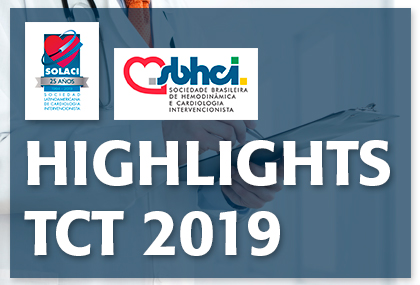Courtesy of the SBHCI.
The 2-year results of the PARTNER 2A trial showed that transcatheter aortic valve implantation has a result similar to that of surgery in patients with aortic stenosis and intermediate surgical risk. We lacked long-term data, both clinical and related to prosthesis function.

Now, at TCT 2019, researchers presented the 5-year data for this work, information long awaited by interventional cardiologists.
The PARTNER 2A trial randomized 2032 patients with severe aortic stenosis and intermediate surgical risk to transcatheter aortic valve replacement (TAVR) or surgical replacement in 57 sites between 2011 and 2013. Patients were eligible for transfemoral access (n = 1550) or transapical/transaortic access (n = 482). The primary endpoints analyzed were all-cause death or stroke, and the analysis also included echocardiography results, so as to count with durability data.
At 5 years, death and stroke were 47.9% in the TAVR group and 43.4 % in the surgery group (p = 0.21).
For patients who received the prosthesis through transfemoral access, there were no differences at 5 years (44.5% vs. 42%; p = 0.8); however, in patients who required transapical/transaortic access, surgery had better outcomes (59.3% for TAVR vs. 48.3% for surgery; p = 0.03).
At 5 years from implantation or surgery, over 95% of patients in both groups were free of aortic valve reintervention, with an advantage favoring surgery (99.4% vs. 96.8%).
The gradients for bioprostheses at 30 days, 1, 2, 3, 4, and 5 years were similar for both strategies (around 10 mmHg). It was different for aortic regurgitation, with an advantage in favor of surgery (33.3% vs. 6.3%; p < 0.001). The severity of aortic regurgitation was related with all-cause death, which occurred in 64.8% of patients with moderate or severe regurgitation, 48.7% of patients with mild regurgitation, and 41.1% of patients with no regurgitation (p < 0.001).
Courtesy of the SBHCI.
Original title: Outcomes from a Randomized Trial of Transcatheter vs. Surgical Aortic Valve Replacement in Intermediate-Risk Patients with Severe Aortic Stenosis.
Presenter: Vinod H. Thourani.
Link to the SBHCI publication AQUÍ
Original title: PARTNER 2A – 5-Year: Outcomes From A Randomized Trial Of Transcatheter Vs. Surgical Aortic Valve Replacement In Intermediate-Risk Patients With Severe Aortic Stenosis.
Author of the original article: Vinod H. Thourani.
Get the latest scientific articles on interventional cardiologySubscribe to our weekly newsletter
We are interested in your opinion. Please, leave your comments, thoughts, questions, etc., below. They will be most welcome.





